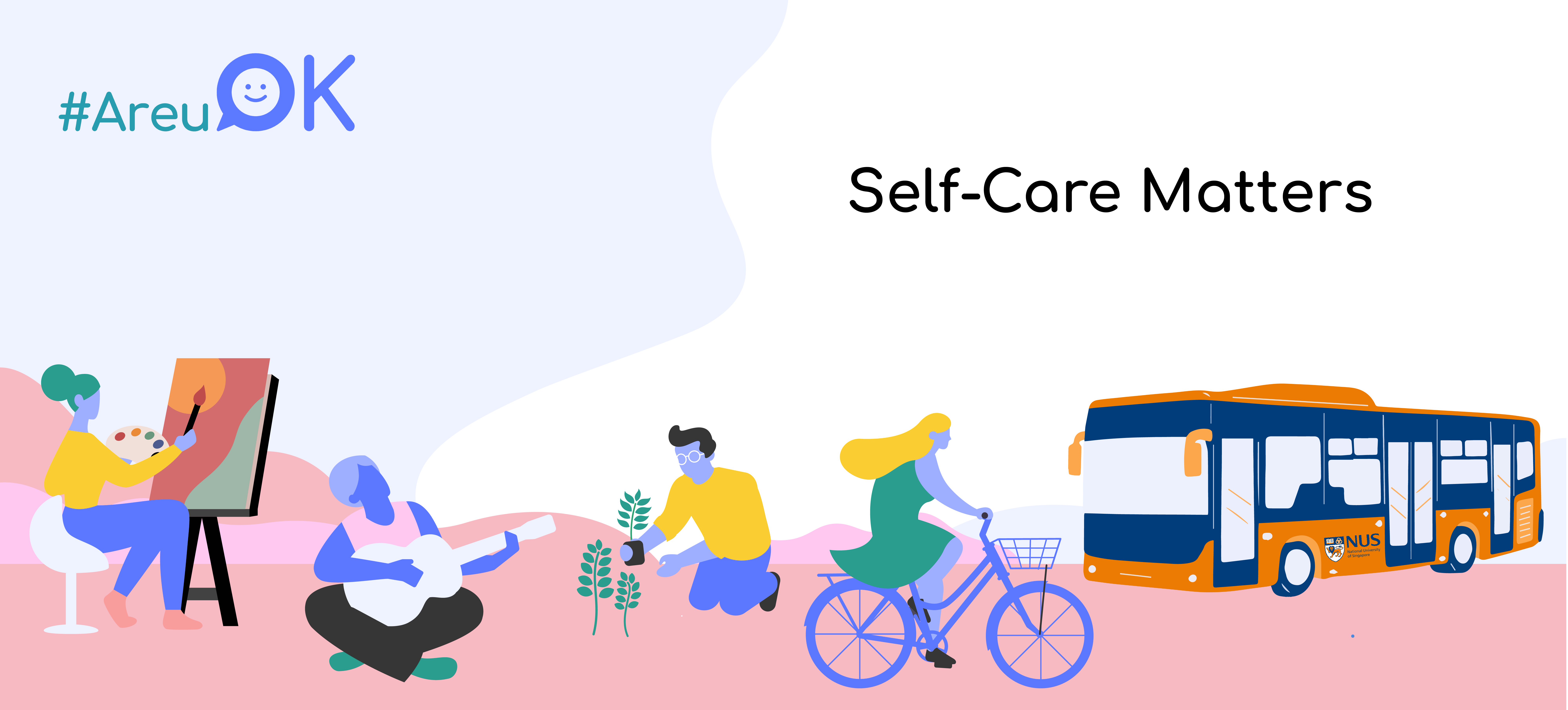

Feeling weighed down by stress and concerns?
It’s okay to be open about sharing your thoughts and feelings. You can always approach:
- Student WellnessManager (OSAcares@nus.edu.sg)
- Student Support Manager (from your respective faculty)

Respect is a requisite for healthy relationships and interactions. It’s normal to have disagreements in a relationship, but this is not an excuse for disrespectful behaviours.
When there is a lack of respect, our conversations and interactions become about defending pride and self-esteem. While we seek respect from others, let’s also demonstrate respect ourselves:
- Listen before speaking. Before expressing your viewpoint, listen to what others have to say.
- Be emotionally empathetic. You can never know exactly what’s going on in someone else’s life — so when you speak to them, don’t be judgmental, impersonal or closed-off. Keep yourself emotionally open, pick up on others’ cues and practice empathy.
- Be respectful of other people’s language, culture, gender, race and religion.
- Value others’ opinions. Always make sure to value others’ opinions, encourage expression, consider their viewpoints and collaborate as the different viewpoints open up new ideas and possibilities that are unhindered by our own preferences.
References
- Crucial Conversations Training: Summary of Techniques. Retrieved from: https://virtualspeech.com/blog/crucial-conversations
- How to Demonstrate Respect in the Workplace. Retrieved from: https://www.thebalancecareers.com/how-to-demonstrate-respect-in-the-workplace-1919376
Resources: Empathy & Respect
Guide to Healthy Relationships
Relationships – be it with friends or a romantic partner – are part and parcel of university life and have the potential to enrich it. It’s okay to have disagreements in a relationship, but this is not an excuse for violence or abuse.
While everyone has their own ideas of what a good relationship looks like, there are some common things that defines a relationship as “healthy”.
Here are some tips on how to foster a health relationship.

Find the right time. Set aside a time when you know you will be in a calm mood, and ensure you have enough time to discuss the matter with the other person.
Talk face-to-face. Avoid talking about serious issues over text as they can often be misinterpreted. Wherever possible, talk in person as it allows the both of you to better convey your feelings.
Don’t expect the other person to read your mind. No one is able to intuitively know your thoughts or feelings or what your needs and wants. Instead, work on communicating these clearly to one another.
Use “we” more than “you”. Our words can come across as harsh even if we mean well. “You” statements may make the other person feel like you’re pointing fingers and placing blame, and thus less receptive towards what you have to say. For instance, instead of saying “You’ve been distant with me,” consider saying “I feel that we’ve be distant lately”.

Be mutually respectful. Try to stay calm in the heat of the moment. No matter the issue, neither of you should be physically, verbally and/or emotionally abusive. Keep the focus of the argument on the issue and don’t make it personal.
Set rules, be it for arguing fairly, making up or breaking up. You may, for instance, agree to take turns airing thoughts and feelings, not pretend like it didn’t happen, or break up if the relationship isn’t work out.
Get to the real issue. Take a moment to evaluate if there is a larger issue at hand, and be understanding of the other person instead of just trying to get your point across.
Listen to the other person. It’s natural to want to defend yourself, but this can be counterproductive especially if it involves sarcasm, put-downs and dredging up the other person’s past mistakes. Instead, work on listening to what they have to say and talking through it with them.
Agree to disagree. It’s okay to not agree with your friend/partner on absolutely everything. If the problem is small sometimes it’s best to just drop it. If you can’t agree to disagree, it may be a sign that you’re not compatible.

Define your boundaries. You need to know what you like and dislikes, what makes you comfortable and what doesn’t, as well as how you want to be treated in given situations. It’s okay to want to care for yourself.
Communicate your needs and limits (be it emotional, physical, or sexual). It’s okay to have preferences and to let the other person know how important these are to you, but do so respectfully, firmly and clearly. Many boundary violations stem from misunderstandings or an unawareness of what these limits are.
Set consequences. Ensure these are practical enough for you to follow through, which provides a clear message to the other person that they should stop violating your boundaries. The magnitude of the consequences should also fit the magnitude of the violation, otherwise you won’t be taken seriously.
Stick to your boundaries. Getting others to respect your boundaries starts with you. If you are serious, others will learn to treat you the way you want and need. Otherwise, they might think that it is okay to cross them.
Respect each others’ boundaries. Treat others as you would want to be treated, and spend some time understanding what is important them as you would want them to do for you.

Ask yourself how you feel about yourself in the relationship. A healthy relationship is not only about enjoying who the other person is but also enjoying who you are when you are with them. If you don’t feel happy about where you are right now, it’s okay to put yourself first and admit that it just isn’t working anymore.
Ask yourself how you feel about the relationship. If each day or interaction with the other person leaves you feeling drained and is taking a toll on your mental health, you may be in a toxic relationship.
Take your time to heal and rediscover yourself. It’s okay if you need time to work on yourself before putting yourself back out there. It’s also okay to want to be alone for a while.
Love Is...
Caring
Trusting
Accepting
Supportive
Respecting Boundaries
Love Is Not...
Controlling
Abusive
Untruthful
Possessive
Physically Violent
Empathy Checklist
Here are four selected questions from the Interpersonal Reactivity Index (IRI; Davis, 1980, 1983) that are commonly used to measure empathy.
Reflect on these four statements to have a better understanding of your personal level of empathy.






